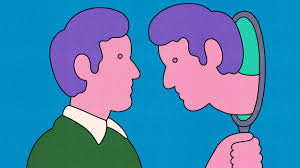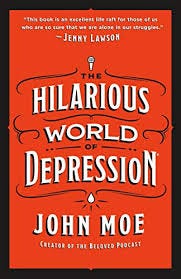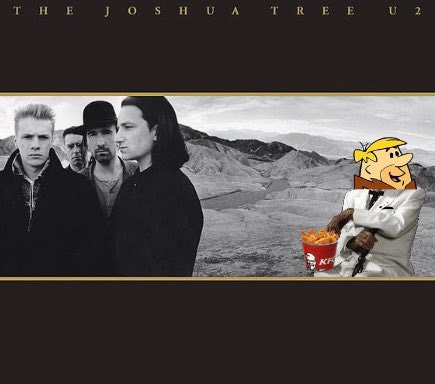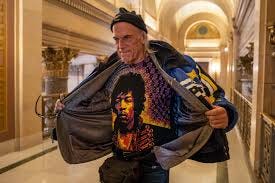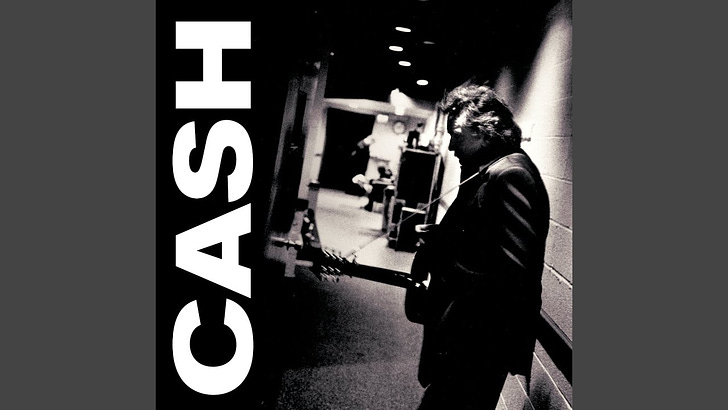

Discover more from Depresh Mode
Awareness: Literally the Least You Can Do
"A little less conversation, a little more action" - Elvis and The Nation
I’ve always found “money-saving tips” articles to be anywhere from irksome to infuriating. “Skip that latte and bring coffee from home!”, “Drop the gym membership and frantically run everywhere!”, “Lose those pesky pounds by never buying groceries and thus starving!” All sorts of little ways that working people who can’t make ends meet can deprive themselves yet further.
Because those articles never have tips like, “Make Jeff Bezos, the world’s richest man, hoarding significant portions of American dollars, pay Amazon employees much better!” The reason for the scraping by is not indulgent latte consumption, it’s an obscene lack of wealth distribution in a system perpetuated by the people for whom it benefits.
Sometimes I feel the same about awareness programs: they’re addressing the wrong end of the problem. Sure, being aware that there’s an opioid crisis is a fine first step, but unless there is a plan of action to get behind, to move the social issue to the people who can affect change and improve things, it’s just going to make people feel helpless.
That’s a similar take as what Colette Shade takes in The Nation. Her article, The Problem With Mental Health Awareness, Shade writes about (and throws shade upon) numerous heavily funded awareness campaigns over the years, saying even if they’re well-intentioned, they tend to be vague to the point of pointlessness.
Whether they’re backed by brands, nonprofit organizations, or government entities, campaigns telling us to “reach out,” “get help,” and become “aware” of mental health issues have become ubiquitous across the United States.These initiatives are attempts to deal with a series of public health emergencies in the country. Between 1997 and 2017, the national suicide rate rose 33 percent, with the steepest increase occurring after 2006. In 2018, 39 percent of Americans told the American Psychiatric Association that they felt more anxious than they did the year before. And opioid overdose deaths have risen to epidemic levels. According to the Centers for Disease Control’s most recent data, the national opioid overdose death rate rose by 9.6 percent between 2016 and 2017.
The problem isn’t the lack of awareness of the problem. The problem is and has always been lack of awareness of the CAUSE of the problem. It’s great to be aware of a severed artery, it’s more important to be aware it has happened and how to stop the bleeding.
Shade argues that a lot of the mental health crisis comes from issues that can’t be resolved even if you’re able to get to a really good psychiatrist or therapist. For instance, the socioeconomic fabric of American life.
Experiences of structural oppression—based on race, sexual orientation, gender, disability status, age, and more—are a major cause of stress. Stigma related to gender and sexual orientation contributes to higher rates of suicide and drug use among LGBTQ populations. Videos of police violence are a source of trauma, especially for people of color. There are also unique mental health problems related to the experience of immigration, and living in fear of ICE causes an incredible amount of stress.
I tend to focus a lot of my work on the individual. How YOU can understand what might be going on with your own mind, other stories that you can relate to and perhaps feel emboldened by enough that you can find steps to improve. In some future work, I’m planning to get at some larger societal issues as contributors because I think those are mental health stories. But it doesn’t take long from there to get to issues of the general realities of systemic oppression and at that point, it’s a much bigger story with tentacles reaching everywhere. Not literal tentacles. This isn’t a lovecraftocracy.
Side note, my daughter is a little person, born with dwarfism. We always get a kick out of things like Dwarfism Awareness Month. As she says, it’s kind of hard to see someone with dwarfism and not be aware. “I don’t think awareness is the problem,” she says, “It’s what people do once they are aware.”
Here’s a Goodreads review of my book from someone named Deb. She liked it. I am trying to sell you something.
Now that it’s surely run it’s course and we’ve even moved past meta-commentary…
I want to talk about the Bernie meme. Now that you’re sick of it and now that it’s not funny anymore.
The meme is a healthy sign, I think. It’s an indication of healing.
We’ve just emerged from four years of combustible, unpredictable stress from the White House, a terrifying and protracted campaign, and an attempted coup, the stress of which we’ll live with for a long time. And at the inauguration, here was Bernie Sanders, seated, in a brown coat, holding an envelope, socially distanced. Nothing exciting, interesting, or exciting about it. Because of that contrast to current events, perhaps, we loved it. It was a great event for the internet.
Here was a guy being ordinary. Brown coat. Running errands, maybe? Chilling, literally and figuratively. Maybe we longed to be Bernie. Maybe we saw it as an act of defiance. Maybe old men who appear a bit grumpy (which I don’t think he is) are just inherently humorous. In that moment, we collectively decided to make a thing of it, like a huge class art project. We connected through this shared, absurd anti-comedy. Whether you were a Bernie voter or not, maybe even across party lines. Best of all - and this is important - we have reached a tipping point of basic photo editing aptitude.
Biden was up there talking about unity like he always does and America answered with the Bernie meme.
The first one I saw was by Jason Gore on Twitter.

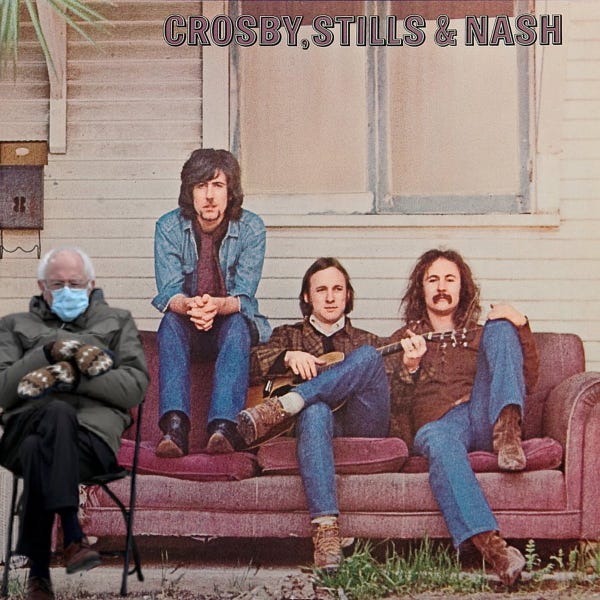

Here’s where I could insert 3,000,000 other variations but I shan’t.
Open Mike Eagle made a 26-second song.
Big big mittens.
I think, too, Bernie meme was how we connected in a time that we couldn’t. We couldn’t hold public events to observe this huge transition in American politics so we just threw a Bernie meme instead. Bernie meme was our party.
So good for us. We’re weird as hell.
Here in Minnesota, the My Pillow Guy (real name: Ted My Pillow) is being talked about as a candidate for governor, despite having no experience in government but some recent experience wandering around the White House trying to get someone to impose martial law and overthrow the incoming elected President.
I want to say that this represents America being a land of opportunity but I just think it’s the recurrence of Minnesota’s have-you-lost-your-damn-mind approach to gubernatorial politics.



